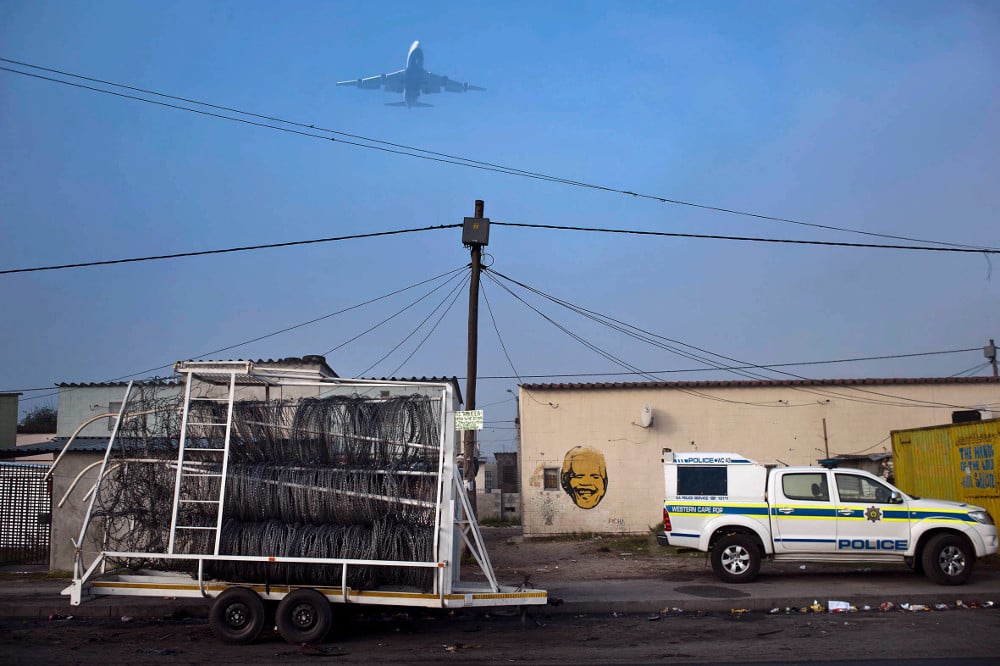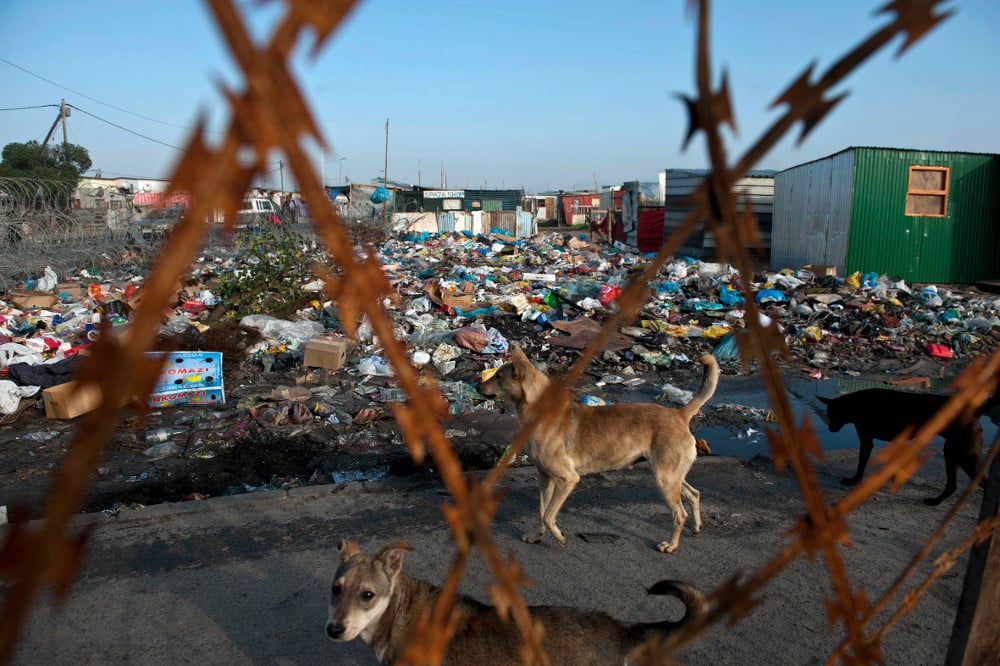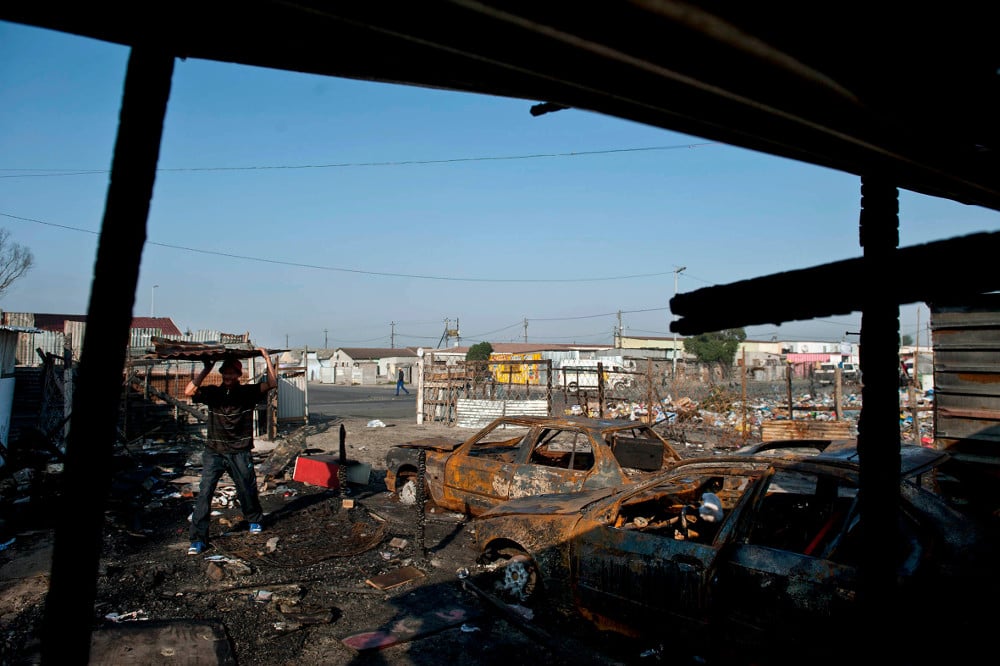The informal settlement of Marikana in Philippi
NEWS ANALYSIS
In Late May, the township of Philippi where the main thoroughfare Symphony Way divides Marikana shack settlement from Lower Crossroads, erupted in seemingly senseless violence. To be sure, much of it was uncoordinated and lacked direction. The first thing you realise upon visiting is that media reports have actually understated the extent of destruction. Still, to a significant degree, reason is in fact the order of the day. Much is happening behind the scenes showing a thriving and deeply introspective group of communities.
Act 1: Occupations
Symphony Way is a main arterial road made (in)famous by land occupations. Evicted from N2 Gateway houses in 2008, pavement dwellers occupied Symphony Way in Delft until their eviction two years later to Blikkiesdorp. Now they are in the news again, fighting a third eviction to make way for the Cape Town airport’s expansion.
In 2011 backyard residents occupied empty land in Philippi and called it Zone 14. Their court case is ongoing. Then, in 2013, Lower Crossroads backyard residents occupied unused land adjacent to Zone 14, naming it Marikana.
After being evicted a dozen times without a court order, residents were finally able to negotiate an interdict to prevent further action by the city.
Last year, more families began building next to Marikana, christening the new settlement Rolihlahla. Word spread and thousands turned up and began clearing hectares of unused land to build a new life for their families in “New Marikana”.
Symphony Way is a road shaped by occupations. To the tens of thousands who have made it their home, it is a beacon of hope that a new life is possible for those willing to fight for it.
Act 2: War zone
Entering Symphony Way from Stock Road in the aftermath of the service delivery protests that led to the violent clashes between Marikana and Lower Crossroads presents a visual of communities unmade by destruction.
The road is strewn with garbage, rocks, huge cement blocks and burned metal wiring that was once an assemblage of blazing Dunlop tyres. Sections of the road are dug up, creating the inverse of a speed hump – infinitely irritating to speeding taxis, yet ironically safer for children playing nearby.
On the right are burnt RDP houses with their ceilings caved in. Four destroyed homes sit along the road. A few more, including the local councillor’s, are found deeper inside Lower Crossroads.
On the left are zinc homes that have been scorched, demolished or abandoned. About 40 burned-out shacks are visible from Symphony Way and many more are hidden in the Rolihlahla and New Marikana settlements.

Police keep a watchful eye on the area after violence broke out between the residents of the informal settlement of Marikana and those of Lower Crossroads. (Photos: David Harrison, M&G)
Police vehicles are in the middle of the road and armoured Nyalas drag trailers of the barbed wire that was used to separate residents on either side.
Still, there is no war without its refugees. Thousands have locked up their homes and fled. In the Rolihlahla settlement alone, leaders estimate that half the population is sleeping elsewhere, hoping to return once the area is safe.
Act 3: A rationality of anger
While speaking to Makhulu Judith, an elder in the Old Marikana, we are interrupted by a raucous young man, Raymond. Many people I interviewed were understandably hesitant to give their surnames because of the fear generated by the recent violence.
Raymond’s mannerism offends Makhulu Judith, but I am intrigued. His stories meander from recounting his days herding cows on land that is now occupied to the conflict that has erupted and his general anger at almost everyone. I can’t quite figure out what is real and what is his imagination.
“They treat us like dogs here,” he shouts.
I wonder whether he is referring to people like Makhulu Judith or the residents of Lower Crossroads. But he soon clarifies who “they” are: the politicians, the government, the police, the wealthy suburbanites.
You can sense his unruly anger. A bit crazed, a bit intense, he unsettles Makhulu Judith and her friends. But he is no irrational, foolish youth. His younger brother, Justice, explains that, unlike himself, Raymond has had an education.
Raymond lets fly his logical relationship with the recent violence: “They have guns … I used to have a gun, but it was taken away by police.”
A resident of Old Marikana, Raymond was not party to the protests that began when residents of New Marikana claimed their homes had been disconnected from the electricity supply. Yet he very well could have been.
He is angry with the one side for starting the violence and with the other for retaliating.
He indicates to me that if he still had a gun and lived in New Marikana, the chances are that Raymond would have returned fire when the mob from Lower Crossroads attacked and killed at least three people.

Dogs scavenge for food in the refuse from the informal Marikana settlement.
Justice says his big brother is “not right in the head” because of tik. Raymond even steals from him, he says.
But it is pain like Raymond’s – the pain of being “treated like dogs” – and the consequent fury that is driving the violence.
One can neither understand the destruction nor the ANC factional fights in the area without comprehending people like Raymond, who is aware of the structural onslaught against his humanity.
Act 4: Collective wisdom
Gcinikhaya Nqaqu is the pro-bono lawyer for the Rolihlahla residents, who did not join the New Marikana protests. Yet when bands of Lower Crossroads residents struck, Rolihlahla was targeted and Nqaqu’s car was burned.
He invited me to attend a public meeting held among the Rolihlahla shacks. Besides a quick discussion of their pending eviction case, the main item on the agenda was how to quell the tension between the two sides.
In poor areas where residents lack home insurance and the money to rebuild, the idea of collective reconciliation and retributive justice is not an airy-fairy philosophy but a practical way of ensuring the reconstruction of social relations following a conflict.
A committee member suggests a solution: since a member of their community is responsible for destroying one of the houses across the road, they should collect R50 from each Rolihlahla resident to fix it.
Responses to this proposal are not all positive, yet no one skirts their collective responsibility. In fact, residents call for volunteer builders, carpenters and painters to help out as well.
The city’s disaster management division has not helped people whose homes were burned down or the hundreds displaced by the violence. Wilfred Solomons-Johannes, from the mayor’s office, has justified the city’s inaction by implying that these are acts of criminality.

The car belonging to Gcinikhaya Nqaqu, a pro-bono lawyer for Rolihlahla residents, was set on fire.
For its part, Eskom has denied responsibility for the electricity disconnections in the area but says it is liaising with residents. Spokesperson Jolene Henn says Eskom is willing to install formal electricity connections at the request of the City of Cape Town, if given permission by the landowners or if the city purchases the land.
Solomons-Johannes cites the Municipal Finance Management Act to explain why the city is prohibited from providing electricity and other services on private land, even with permission from the landowner.
Still, a reading of the Act finds no clause that explicitly lays out such a provision and informal conversations with two lawyers place doubt on whether such a prohibition exists. The city did not respond to follow-up questions on this matter in time for publication.
Act 5: Redirecting ire
Makhulu Judith’s response to the seething anger and subsequent violence is defiance. She sees the emotion as justified but wants the people of New Marikana to realise that “they [the residents of Lower Crossroads] are poor people like you; they are also staying in shacks before they get houses”.
Where should the anger be directed? She believes that it is the government’s fault that services are not being provided. Why blame other residents?
Others hold similar sentiments. New Marikana residents have gone to Lower Crossroads to apologise for their collective role in the destruction. In Rolihlahla, leaders have held reconciliation meetings to build common ground.
They recognise that they cannot remain angry with one other when apparent inaction by the government is to blame.
In the aftermath of this war, as the sound of hammers permeates the Marikana landscape, hope is renewed.
Yet it is far from clear whether residents will unite and target their fury at the government or if their wrath will continue to turn inward against one another. But one thing is for sure: this anger will not simply fade away.